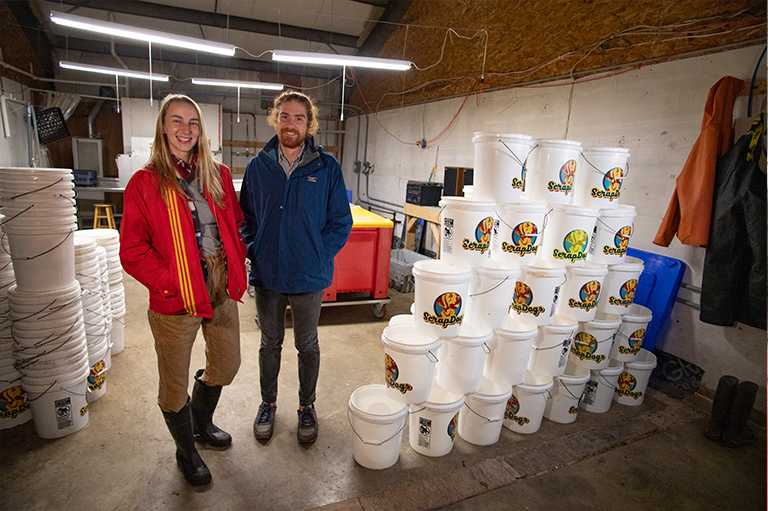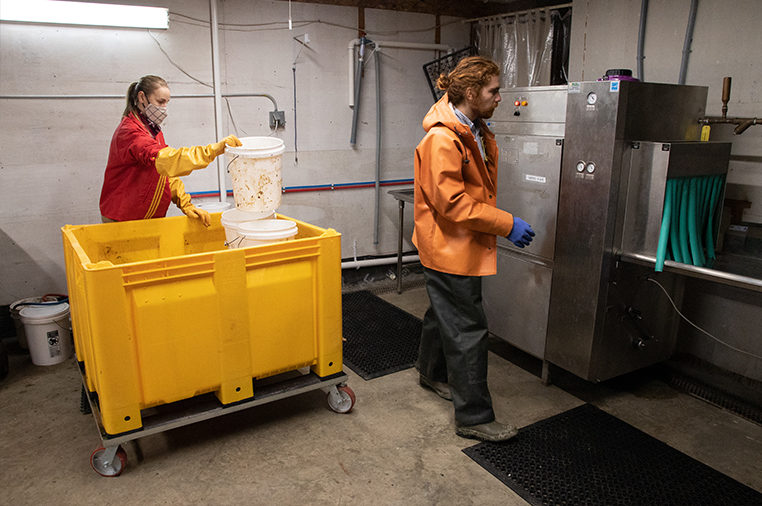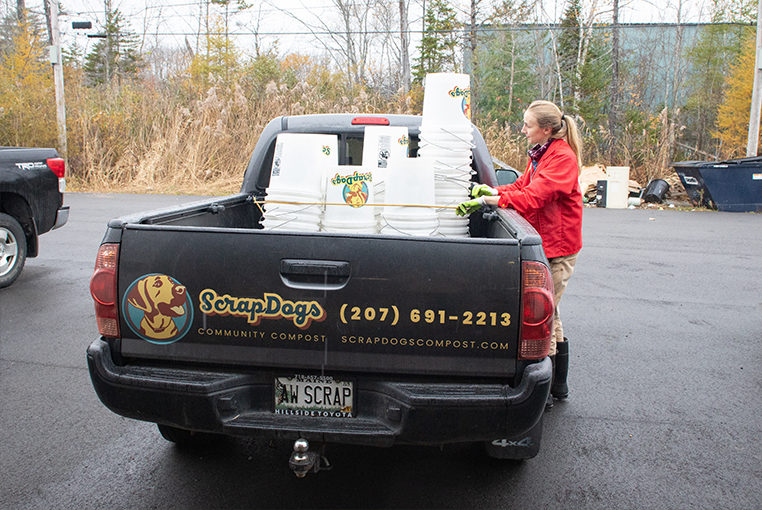BACKGROUND
Many who set out to do good in their communities might consider the nonprofit business model, while others choose to become green entrepreneurs and create for-profit businesses that are focused on sustainability. Tessa Rosenberry and Davis Saltonstall have tried both, and they believe that, while there’s no one-size-fits-all approach to finding a sustainable model to do good, the model you ultimately follow will likely be dictated by your circumstances.
When the pair first decided in college to work towards reducing the waste that ends up in landfills, they tried the nonprofit model to fund an innovative recycling project. That project, which they described as overly ambitious for their resources and knowledge base, ultimately didn’t pan out.
HOW IT WORKS
Even though their first endeavor didn’t go as planned, they still believed the mission to divert waste away from landfills was an important one. They then shifted to a simpler approach that already had a track record of success—collecting food waste to convert into compost for local farmers. That business, ScrapDogs Community Compost, has seen more success, thanks to the couple’s hard work and a dedicated group of customers throughout midcoast Maine who also believe in the importance of creating sustainability in the state’s food systems.
Rosenberry and Saltonstall’s business makes it easy for customers to compost their food scraps in such a way that removes the “messiness” of maintaining a home compost pile but enjoying the benefits of compost for gardens. Monthly subscribers have their compostable material picked up on a regular basis with an equivalent amount of high-quality compost returned to them as part of their subscription.
Then came COVID-19, and food waste collection posed too great a risk for a small-scale business. ScrapDogs paused business for roughly half a year, a time period that would have sunk many other new businesses. Fortunately, ScrapDogs’ mission-driven nature offered some resources to keep the business afloat. Some dedicated customers paid in advance for collection, and the business was able to receive funding from the Island Institute’s Tom Glenn Community Impact Fund and CEI (Coastal Enterprises Inc.). The pair used the time to invest in infrastructure to make the business more sustainable, and to expand their business plan to include food delivery from local farms.
Tessa Rosenberry and Davis Saltonstall give their thoughts about ScrapDogs Community Compost, and the lessons they learned as fledgling green entrepreneurs.

Q&A WITH TESSA ROSENBERRY AND DAVIS SALTONSTALL, OWNERS OF SCRAPDOGS
Why were you excited to work in food waste?
Tessa: We have always been passionate about food systems on top of waste systems, especially where the two intersect—the idea that you’re consuming things, and then there’s still stuff left over that can be reutilized to grow the things that you were originally consuming. That is such a fascinating circle for us.
How do you make a mission-driven business or nonprofit economically viable?
Tessa: I think the fact that our nonprofit didn’t pan out was very crucial to our understanding of how we built our business. There’s a lot of disappointment and lingering questions, like “If only we had focused on” or “If only we had done this differently,” but we were able to use that moving forward.
Davis: You can spend a lot of time muddling around when just talking to the right person would give you so much better insight on what is actually viable. We were connecting with a bunch of people who were very excited about what we were doing, but we didn’t really have the capacity or the skills necessary to bring it to the place where we wanted it to go.
I would say, go forward, experiment, but definitely try and cast a line down and try and understand exactly what your value is, who you’re building that value for, and where that funding is going to come from based on what the interest is out there. Also, when you get to figuring out what your cash flows are, and how you get compensated, it’s important to fully understand how you can make a living out of something. It’s about putting yourself in that equation. There’s an element of how much financially that goal means to you.
Tessa: It is so great to be passionate about something, but you had better make sure that other people are too. With that first nonprofit, we were so excited about the idea, and we were in this university bubble where everyone was like, “You guys are doing great.” But then we exited that environment, and we realized it was a difficult market, and that we would have had to really adjust or refine our plan. We didn’t have the capacity or the knowledge to do that. With ScrapDogs, we already knew there was a market for it and an interest in it. There’s enthusiasm around it, and there were existing successful models.
How did the enthusiasm for your mission-driven business help ScrapDogs during the pandemic?
Davis: I think people were willing to support us up front, so they prepaid for their services for a year to help us with costs and investments. We also worked with CEI (Coastal Enterprises Inc.), which provides business incubation help in Maine); they are very values-led in terms of their support for small businesses. And we received grant funding from the Island Institute, and had been awarded a Maine Department of Environmental Protection grant. All those things together helped us wade through those six months.
How did the pandemic sharpen your focus as social entrepreneurs?
Tessa: It transformed how our business operates, and also how we think about it operating. Davis and I have said a few times to each other that pre-COVID we were working on a big project, and post-COVID we were running a business. It was really an opportunity for us to clarify what our goals and mission are, and also figure out how we’re going to be able to implement it in a way that hopefully is sustainable going forward.
“Pre-COVID we were working on a big project, and post-COVID we were running a business.”
We built up some good physical infrastructure for ourselves, we obtained a space to work in that is separate from our living space, we solidified some good partnerships, and we added a whole revenue stream to our business model.
We’re now delivering local food to some of our customers. It’s in line with our mission and the network that we’re already building with local farms. We thought, “We’re already on the road going to all these people’s houses with this other service. Why don’t we use the same miles to close the loop for each of these people, to connect them to this amazing local food system even more than they might already be?”
RESOURCES
- scrapdogscompost.com
- CEI Grants and Loans
- Island Institute – Tom Glenn Community Impact Fund Grants
- Maine Department of Environmental Protection Grants and Loans
- Common Good Solutions
- Conscious Revolution
The interview above has been edited for length and clarity.



